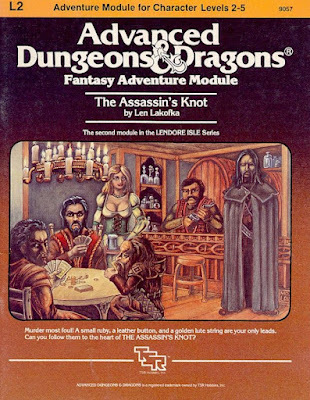Retrospective: The Assassin's Knot
 My appreciation for The Secret of Bone Hill is well known. Alongside The Village of Hommlet, I consider it one of the best low-level adventure modules ever written for Dungeons & Dragons, in large part because of the care author Len Lakofka took to establish its "home base," the village of Restenford. However, in both of the aforementioned modules, there's another important ingredient: the menace that lurks on the borders of the that home base. Without the Moathouse and the titular Bone Hill, I suspect my affection for these modules would diminish considerably, if not evaporate completely. I like both adventures because of the effective contrast between the sleepy outposts of civilization and the evil that threatens to overwhelm it.
My appreciation for The Secret of Bone Hill is well known. Alongside The Village of Hommlet, I consider it one of the best low-level adventure modules ever written for Dungeons & Dragons, in large part because of the care author Len Lakofka took to establish its "home base," the village of Restenford. However, in both of the aforementioned modules, there's another important ingredient: the menace that lurks on the borders of the that home base. Without the Moathouse and the titular Bone Hill, I suspect my affection for these modules would diminish considerably, if not evaporate completely. I like both adventures because of the effective contrast between the sleepy outposts of civilization and the evil that threatens to overwhelm it.
In The Assassin's Knot, Lakofka attempts to mine the same vein – to much more mixed results, in my opinion. First published in 1983, the module is a follow-up to The Secret of Bone Hill, starting with the fact that, like its predecessor, it takes place on Lendore Isle in the World of Greyhawk. More importantly, the ultimate antagonist of the adventure is a character first introduced in Bone Hill (where his eventual villainy was explicitly mentioned, the consequences of which would appear in a future adventure, namely this one). Nevertheless, The Assassin's Knot can stand more or less on its own.
The bulk of the scenario takes place in another little town, the implausibly named Garroten. Like Restenford, Lakofka lavishes much detail on this settlement and its inhabitants. We meet Gelmark and Lydia, a pair of retired adventurers who married and settled down to run the general store. We also meet Krak, the half-orc armorer who's sometimes possessed by an evil sword he acquired some time ago, as well as many more characters, each with their own personalities, quirks, and backstories. Most are genuinely well done and it would be very easy for a referee to spin this information into many more adventures. This is where The Assassin's Knot excels and why I still have a soft spot for it.
However, the main action of the module is not as well done. As its title might suggest, The Assassin's Knot concerns the assassination (by strangulation) of Baron Grellus of Restenford. Clues left at the scene of his murder point toward the town of Garroten – you see what I mean about the town's infelicitous name? – and the characters are tasked with discovering the identity of the murderer and bringing him to justice. On the surface, this all sounds compelling. As most experienced referees no doubt know, murder mysteries are a lot more difficult to execute successfully than they might seem and it's rare that published adventure modules do this well. There are simply too many ways that things can go of the rails, which is a recipe for frustration and disappointment for the players.
That said, Lakofka makes a good effort at trying to obviate the most apparent stumbling blocks, starting with information presentation. He provides the referee with a clear summary of who did what when, in addition to their motivations. Thus, the referee is in a good position to handle the characters' investigation of the baron's murder. Unfortunately, the murder itself was motivated by insanity, which makes it much harder for anyone attempting to make sense of it. The matter isn't helped by the fact that the assassin who perpetrated the crime is, in turn, planning to double-cross his patron, thereby creating more contradictory information for the characters to sift. The end result is something of a chaotic muddle, despite Lakofka's best efforts to make things clear.
In the end, I view The Assassin's Knot as a failed experiment – or perhaps, if one is more charitable, a partially successful one. Garroten, its name to the contrary, is nicely imagined place filled with interesting NPCs. Likewise, the module as a whole is notable for not including a single dungeon. Instead, its text is entirely given over to providing clues, information, and NPCs with which to interact. It's an important departure from earlier D&D modules and it's for that reason that I look on it with more fondness than it might otherwise engender. It's not perfect by any means, but it gets a lot of points for effort.
James Maliszewski's Blog
- James Maliszewski's profile
- 3 followers



